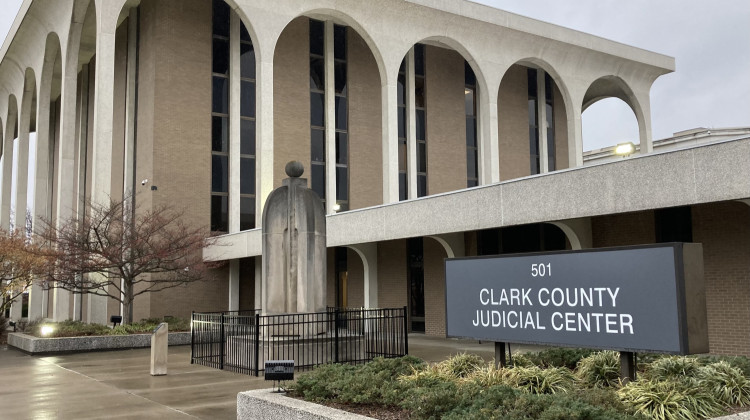
Clark County is working toward implementing a mental health court to help connect people with mental illness to services and support.
Aprile Rickert / LPMClark County Circuit Court No. 4 Judge Vicki Carmichael said she sees people on a regular basis in her courtroom who are living with mental illness. But in many cases, she said, jail time might not be the most appropriate. What they need is support.
“We've got to do things differently,” Carmichael said. “Our jails are full of people who need mental health treatment and not punishment. We see so many people come through the court systems that don't really need to be there, but don't have any other resources.”
That’s why she and other officials and advocates are working to start a mental health court in Clark County — a way to intervene and connect people to services and resources.
It will join the roughly 20 other mental health courts either in operation or in planning stages in the state. They’re part of the system of problem-solving courts in Indiana.
Results of a two-year study released in September by the Indiana Behavioral Health Commission shows one in five people in Indiana experience mental illness, of which around 20% are untreated. That’s led to an estimated annual cost of $4.2 billion in untreated mental illness.
It’s higher among people who are incarcerated, at around 40%. According to the study, nearly half of unhoused people in the state are living with mental illness.
It’s this group Carmichael said the new court will initially focus on — people who may face low-level charges like criminal trespass or disorderly conduct.
“Because they really don't need to be in jail,” she said. “What they need is treatment and resources that help them find ways to live effectively on the streets, if that's where they're going to live.”
Carmichael said the team will be talking with local police departments, asking if they could in certain situations bring people to facilities like LifeSpring Health Systems or Wellstone Regional Hospital instead of jail.
“Let’s take them into the mental health system [and] figure out what their needs are,” she said.
Beth Keeney is the president and CEO at LifeSpring, a community health organization working with the courts on the new program. She said just the nature of being unhoused can put a person at risk for certain criminal offenses.
“People have to exist somewhere,” she said. “So if they don't have a home or somewhere to lay their head at night, they're often in a park or in other places not meant for human habitation. And so that puts somebody at risk for [something] like a trespass charge, potentially something more serious, depending on how they access that property.”
Keeney said Clark County leaders have made it a priority to use the Sequential Intercept Model, which takes advantage of multiple touch points to get people with mental illness or substance use disorder diverted away from the justice system and into treatment. That could mean when they’re arrested, when they go to court or when they’re booked into jail.
“So [it’s] figuring out at every step along the way, where is the opportunity to get that person connected to the care that they need?” she said.
Barb Anderson, director at Haven House Services Inc., has worked with people who are unhoused or housing insecure for more than four decades.
She pointed to the connection between mental health and housing instability.
“It is all intertwined,” she said. “There's hardly anybody who comes through our doors who doesn't have some form of mental health issue, whether it be trauma from domestic violence, or just the trauma of being kicked out of your housing.”
She added that there can be additional trauma just from living on the streets.
Clark County Prosecutor Jeremy Mull said he feels there’s an “extreme need” for the court. He’s seen the connection between mental health, addiction and crimes in the community.
“I've long said that if we could dry up the supply of illegal drugs and get prevalent mental health treatment for the folks that needed it, the crime rates would absolutely plummet,” he said. “So I'm very hopeful that this court can get started and actually make an impact in what's going on in our community.”
Some studies show that people with mental illness are more likely to be victims of crimes than commit them. But research also shows comorbidities like substance use can increase the likelihood of people with severe mental illness committing violent crimes.
Mull said it’s imperative to provide early intervention for people who show signs of mental illness and end up in the criminal justice system, which can help prevent them from advancing to more serious criminal allegations.
“So many of the violent crimes that I have prosecuted have been the culmination of years of a mental health crisis,” he said, adding that in many of the serious cases the person had lower-level crimes early on.
“These are prime times to intervene, and to mandate treatment and get assistance to these individuals so that they don't go on to commit higher acts of violence.”
Mull recently said he was still deciding how criminal charges would work with the program, based on what he feels is best for the community. In some court models, he said, charges aren’t filed, though in others charges can be resolved through program completion.
Anderson, with Haven House, said she believes mental health courts work well when done right, and she has confidence in the people who will operate and oversee the Clark County court.
“I think the best thing is advocating for the client and understanding that it is a mental health issue,” she said.
The new program is expected to start in fall.
Coverage of Southern Indiana is funded, in part, by Samtec, Inc. and the Hazel & Walter T. Bales Foundation.
9(MDAyMzk1MzA4MDE2MjY3OTY1MjM5ZDJjYQ000))
 DONATE
DONATE








 Support WFYI. We can't do it without you.
Support WFYI. We can't do it without you.